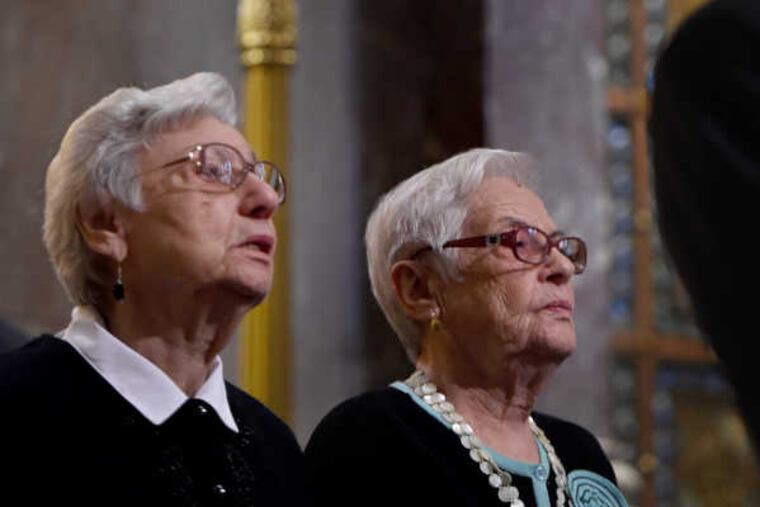Holocaust Remembrance Day touches on past and present
Speaker Kenneth Jacobson, of the Anti-Defamation League, says anti-Semitic incidents up 30 percent in U.S. last year.

Two sisters sat side by side Sunday, listening to the names of the dead read aloud as flowers and wreathes were carried through the sanctuary of Congregation Rodeph Shalom on North Broad Street and placed at the foot of the bimah.
The names included toddlers, teens, and infants who died in Ukraine and Paris, and of course, in Auschwitz, just a fraction of the 1.5 million children killed when the Nazis rounded up and killed six million Jews.
Rachel Brandspiegel's name wasn't read aloud, but her sisters, Bella Tugendreich, and Sara Weingram, remembered the infant, a light that helped them carry on as the Nazis forced them from their home in Pultusk, Poland.
The family walked for 40 days, to Russia, and their youngest sibling, just weeks old, never fully recovered from the trauma of it, the lack of food and medical care as the Nazis pushed them farther east toward the Ural Mountains.
Rachel had the "bluest eyes," Tugendreich said, and died before she was 3.
"She would have been Miss America," Tugendreich, 87, said. "I used to take her outside with me so people would notice me too."
The sisters were among a handful of survivors who joined the hundreds in attendance Sunday during the Jewish Federation of Greater Philadelphia's annual Yom Hashoa, its Holocaust Remembrance Day. Though the event always shines a light on the horrors in Europe over a half-century ago, speakers, much to their dismay, touched on present-day problems as well.
"I think it is an appropriate time to recommit ourselves as a society, both Jews and non-Jews, to standing up against anti-Semitism, particularly as it is resurging both in Europe and here in the United States," said Kenneth Jacobson, deputy national director of the Anti-Defamation League, who came to Philadelphia from New York.
Jacobson said a yet-to-be-released ADL report would show that anti-Semitic incidents rose 30 percent in the United States last year. He mentioned that two million anti-Semitic tweets were directed at journalists last year.
Mayor Kenney said the country cannot let hatred devolve into dangerous movements as it did in Germany.
"We must remember what led to these events: demonizing subsets of the population and blaming them for the problems in society," Kenney said. "This reminds us that we must remain vigilant and look for instances of people attempting to repeat these horrible mistakes."
Kenney mentioned the vandalized Jewish gravestones at Mount Carmel Cemetery in Northeast Philadelphia. On a tour of the damage, he tried to help one man right a toppled stone.
"Please know that Philadelphia is a welcoming and accepting city and no matter your race or creed, you have a place here," he said.
Holocaust survivor Manya Frydman Perel spoke of how the Holocaust changed her, redirected her life and what she hoped her legacy would be. Born in Radom, Poland, Perel was imprisoned in the ghetto there before being sent to several concentration and death camps to do hard labor. She nearly starved.
"I suffered humiliation and torture and hunger just because I was born a Jew," she said. 'I lost my parents and most of my family but it was my destiny to survive the greatest catastrophe on Earth."
In 1945, she escaped into the forest surrounding the Auschwitz concentration camp and was liberated by the Russians.
Tugendreich and Weingram, 90, didn't speak but did rise to light one of six memorial candles, each representing one million Jews.
Mostly, they sat quietly, together, remembering.